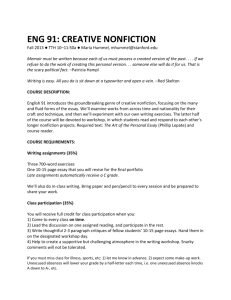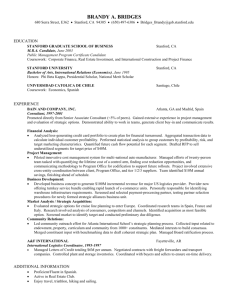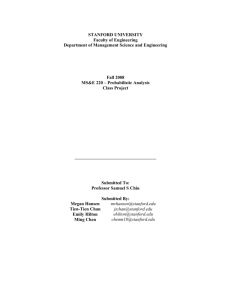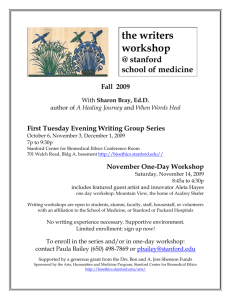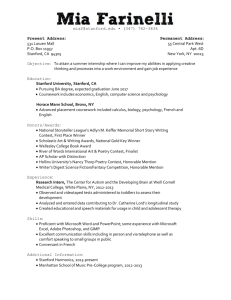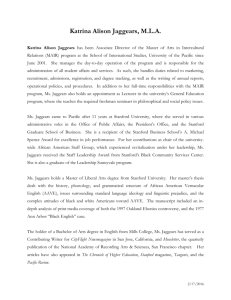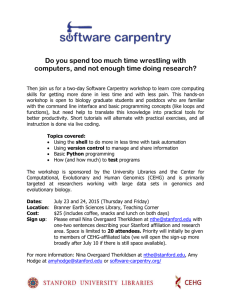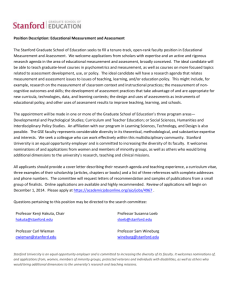Syllabus - Stanford University
advertisement
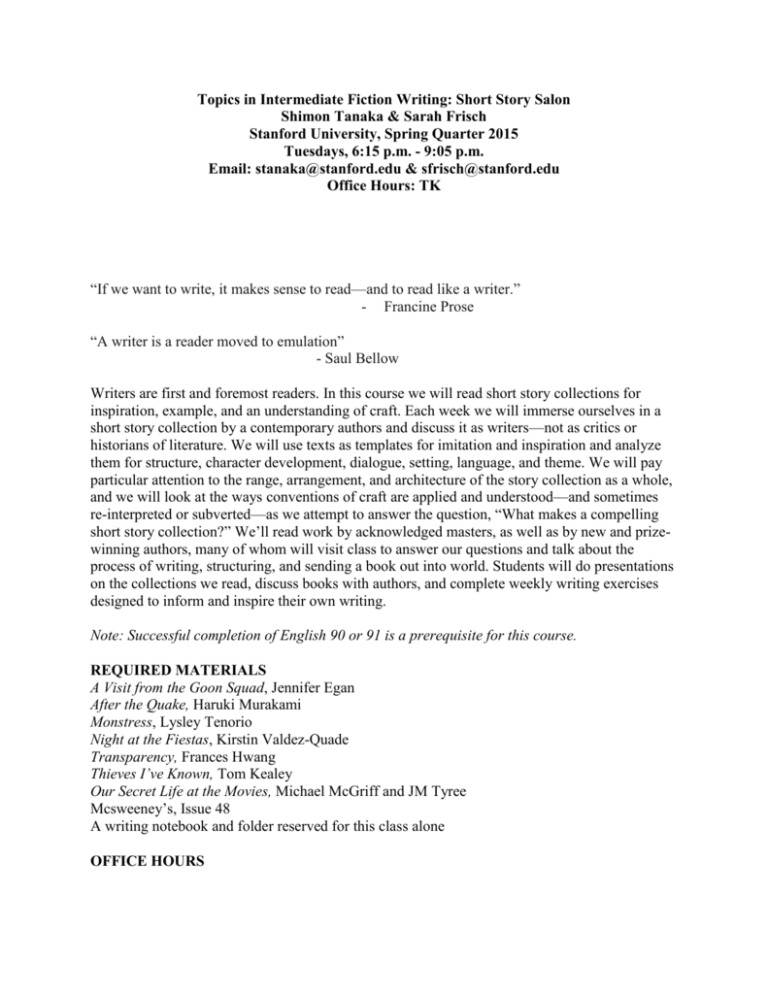
Topics in Intermediate Fiction Writing: Short Story Salon Shimon Tanaka & Sarah Frisch Stanford University, Spring Quarter 2015 Tuesdays, 6:15 p.m. - 9:05 p.m. Email: stanaka@stanford.edu & sfrisch@stanford.edu Office Hours: TK “If we want to write, it makes sense to read—and to read like a writer.” - Francine Prose “A writer is a reader moved to emulation” - Saul Bellow Writers are first and foremost readers. In this course we will read short story collections for inspiration, example, and an understanding of craft. Each week we will immerse ourselves in a short story collection by a contemporary authors and discuss it as writers—not as critics or historians of literature. We will use texts as templates for imitation and inspiration and analyze them for structure, character development, dialogue, setting, language, and theme. We will pay particular attention to the range, arrangement, and architecture of the story collection as a whole, and we will look at the ways conventions of craft are applied and understood—and sometimes re-interpreted or subverted—as we attempt to answer the question, “What makes a compelling short story collection?” We’ll read work by acknowledged masters, as well as by new and prizewinning authors, many of whom will visit class to answer our questions and talk about the process of writing, structuring, and sending a book out into world. Students will do presentations on the collections we read, discuss books with authors, and complete weekly writing exercises designed to inform and inspire their own writing. Note: Successful completion of English 90 or 91 is a prerequisite for this course. REQUIRED MATERIALS A Visit from the Goon Squad, Jennifer Egan After the Quake, Haruki Murakami Monstress, Lysley Tenorio Night at the Fiestas, Kirstin Valdez-Quade Transparency, Frances Hwang Thieves I’ve Known, Tom Kealey Our Secret Life at the Movies, Michael McGriff and JM Tyree Mcsweeney’s, Issue 48 A writing notebook and folder reserved for this class alone OFFICE HOURS Syllabus: Short Story Salon 2 You are welcome and encouraged to come to our office to talk about your work or anything relevant to it. (For example, we’ll often recommend “outside” stories, craft essays, and novels you might personally benefit from reading). If our office hours do not fit with your schedule, we can set up an appointment, either in person or on the phone. CLASS ATTENDANCE POLICY You are allowed one absence. Thereafter, your grade will drop a full letter with each subsequent absence. Students with three absences will be asked to leave the course. On the first day, we’ll match you up with another student, who will be your class buddy for the rest of the quarter. This is the person who you’ll contact with any questions if you miss or are late to a class. Also, since this is a discussion-based class, punctuality is very important. If you are more than ten minutes late to class (or leave class early) without prior permission, this will count as an unexcused absence. Repeated tardiness within ten minutes of class may be treated as an unexcused absence at the instructors’ discretion. STUDENT EVALUATION CLASS PARTICIPATION (40%): It is crucial that you arrive at each class prepared (having done the reading, thoroughly) and ready to actively participate in our discussions. We are here to exchange ideas, thoughts, and stories with one another in the hope that we will learn something about our own writing and writing in general. In discussing the writing of your peers, remember that participation is a courtesy to your fellow writers. It’s important to remember that we won’t be discussing your polished work but early drafts and exercises; we’ll be talking about the process of writing and all of the narrative possibilities inherent in each piece. When you put yourself out there in a personal way— as you do whenever you write—you want and deserve respectful feedback from everyone. Blog Posts and Creative Writing Program Events: Your class participation grade also includes posting on short story collections on the class blog and attending three Creative Writing program readings and posting a brief response to each on the class blog. We will discuss blog posts in more detail in class. A full list of CW readings can be found at http://creativewriting.stanford.edu and http://events.stanford.edu. Please also sign up for the Creative Writing Events Listserve by going to http://mailman.stanford.edu and joining “cw-undergrad.” WRITING EXERCISES (30%): This will include short writing exercises to be completed both in and out of class. The prompts we’ll assign are designed to generate ideas and to inspire your work; as such, we’re not expecting polished pieces in your notebook and encourage you to try new and different things here. If you do the work, put in the appropriate effort, and turn assignments in on time, you will get full credit for this portion of your evaluation. GROUP PRESENTATION (30%): Beginning on Week Three, in groups of 2-3 students, you will facilitate a one-hour class discussion of one of the stories in the collection assigned for that particular week. As a group, you will help us see how elements of craft are working in the story collection and share your insights (and elicit others) about what we Syllabus: Short Story Salon 3 might learn from this writer’s work to inform our own writing. This is a chance for you all to make yourselves experts on the book and to demonstrate to the others how it exemplifies and/or contradicts conventions of craft. Handouts, exercises and other methods of involving the group are encouraged. (More specific instructions regarding the form and content of these group presentations will be provided during our first class.) MISCELLANEOUS Late Assignments: Anything turned in late will receive no better than C credit. And please, no assignments via email unless specifically requested. You can place late assignments in the box outside our office in Margaret Jacks, Room 430, in the box marked ‘Short Story Salon.’ Formatting: Work you are asked to turn in must be typed (in an easy-to-read 12 point font), double-spaced, and stapled, with the pages numbered. Please format for print, not web. Also, keep your spelling and grammatical errors to an absolute minimum. Work that fails to follow these guidelines may be deemed late. Students with Documented Disabilities: Students who may need an academic accommodation based on the impact of a disability must initiate the request with the Office of Accessible Education (OAE). Professional staff will evaluate the request with required documentation, recommend reasonable accommodations, and prepare an Accommodation Letter for faculty dated in the current quarter in which the request is being made. Students should contact the OAE as soon as possible since timely notice is needed to coordinate accommodations. The OAE is located at 563 Salvatierra Walk (phone: 723-1066, URL:http://studentaffairs.stanford.edu/oae). The Honor Code: The Honor Code is the University's statement on academic integrity written by students in 1921. It articulates University expectations of students and faculty in establishing and maintaining the highest standards in academic work. You can find the full text of the honor code at the following link: http://studentaffairs.stanford.edu/judicialaffairs/policy/honor-code Plagiarism: Plagiarism includes, but is not limited to, using ideas, information or quotes from published work or online sources without providing proper citations; copying all or part of an assignment from someone else; and turning in work you did for other classes.

